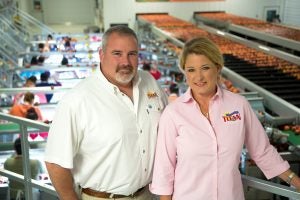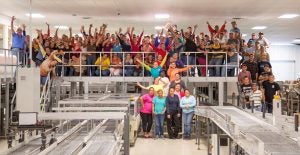Someone once told Chalmers Carr that you can’t be both the biggest and the best, that large volumes inherently mean poor quality.
Carr couldn’t buy into that — it didn’t jibe with his personality, or his vision for his peach farm.
“To build a brand, you have to build it on quality, service, consistency, and everything that goes along with that,” Carr said.
Today, Carr and his wife own Titan Farms, the largest peach grower on the East Coast, with 600,000 trees on nearly 5,500 acres in South Carolina. If you ask him point blank, he’ll tell you that through all the stages of growth, he hasn’t sacrificed quality one bit. In fact, thanks to technology, it’s gotten better.
His belief is that the first one implementing new technology gets it paid for the quickest, so Titans Farms has adapted to the changing world. It has offered its space for R&D for companies and as research space for Clemson University, a South Carolina land-grant institution.
“The fact that we’re a first-generation farm actually gives us a lot of advantages,” said Carr, who, along with his wife and father, is a Clemson grad. “I don’t mean this in a negative way, because there are times when I wish I had had somebody to ask questions of, but making mistakes has been important to our growth. The other side of that is that we didn’t have somebody telling us, ‘Well, this is the way we do it, and we’ve always done it this way.’ We’ve always been able to embrace new technology.”
That includes such things as irrigation technology that shows when and how much water is needed, data management software, variable-speed motors, going from diesel to electric, GPS devices that help him plot an orchard that’ll be around for the next 15 years, and a state-of-the-art stone-fruit packing line, which cuts labor and increases output using camera systems that do grading and sorting and other systems that use bar codes to help direct cartons to certain places.
A soil-moisture monitor and a graph even helped teach him that much of what he knew about water use was wrong.
“We’re able to do more with a lot less because of technology,” he said.
His approach has been so successful that he was selected by Bayer Crop Science as the company’s inaugural Produce Innovation Award winner in 2015.
* * *
Carr grew up in a military family, spending summers working on farms as the opportunities arose. Most of those jobs were on tobacco, peach, or other specialty crop farms. So dedicated he was to the craft that he was helping to manage a farm even before he was out of high school.
“Growing up, if you weren’t at football camp, you were working on the farm,” he said. Carr, of course, was spending a lot of time at the latter.
At that young age, Carr fell in love with the business, particularly with the people who are part of the nation’s food system.
“Especially in the specialty crop world, there are a lot of employees, a lot of variables that you deal with on a daily basis,” Carr said. “The challenge of that was very exciting.”
Coming out of college, Carr had almost nothing to his name. His dad gave him $4,000, and he spent that money on a used pickup truck and entered farming.
The first operation he owned was a Florida farm, back in 1992. Just one year later, an off-season hurricane, coupled with a freeze (including snow in the Sunshine State), cost him his crop that season. The lesson taught him a lot about difficulties and perseverance. It taught him about farming.
Things picked back up, though, and he ended up selling that operation and moving to South Carolina where he’d ultimately buy the 1,500-acre peach farm that would one day grow to be the Titan of the East Coast.

* * *
Even with advances in technology, specialty fruit operations require more manual labor than many other areas of the farming industry. Not only does Carr and his wife, Lori Anne, have the peach farm, but they also grow more than 1,000 acres of vegetables. Some of the farms are on owned land; others are in long-term leases, with the properties as much as 90 miles away from one another. (Carr admits that it won’t be long before they’ll be farming in other states, too.)
“You’re always looking ahead. Peaches, because of the infrastructure that goes into them, you try to farm them as close to your packing shed as you can. Really, vegetables are the same way.”
Carr is a man with a fun sense of humor and is engaging to speak with. From marketing to on-site management, Titan’s leader has become the ultimate people person. Selecting reliable, happy, and loyal workers has been crucial to the business’s growth. He said that in the first 17 years of Titan Farms, he lost only one employee.
“It’s finding good people and trusting them to do that. It’s making them feel like it’s as much theirs as it is yours,” he said. “It’s not Chalmers’ farm or Lori Anne’s farm, it’s Titan Farms, and everyone wears the Titan badge the same way.”
He believes it’s important to put a face to the product name. Two years ago, he created an in-house sales team to help build a more direct connection between the farm and the companies who buy his food. It also gives him the opportunity to better share his story.

* * *
Titan Farms continues to innovate to stay current with trends and get the most value out of its products. One of those paths has been developing the processing side of the business.
Because not every peach makes the top grade, over the years, many have been discarded for being overripe or having cosmetic blemishes. Even saying “many” doesn’t capture the magnitude of the waste. Carr said that for several years, about 25 percent of his crop would fall into that category — a number that equates to about 370 tractor-trailer loads (for comparison, more peaches were tossed out by Titan annually than were produced each year by the entire state of Michigan).
There aren’t enough livestock operations in South Carolina to use the waste as a viable feed source for animals, yet Carr knew that something had to be done.
Carr saw an increase in demand for peaches in frozen foods and other value-added avenues, particularly in the wake of the California drought and that state’s decline in production.
In 2016, Titan opened its cutting-edge packaging facility.
The new facility has a computerized weight-sizer to ensure the accuracy of products, and it uses new software to keep precision packout records that help guide production and marketing decisions. It’s also outfitted with modern food safety and security measures.
“We’re as completely vertically integrated as we can be,” Carr said. Though if the opportunity arises, you can expect him to continue to push production innovation.



